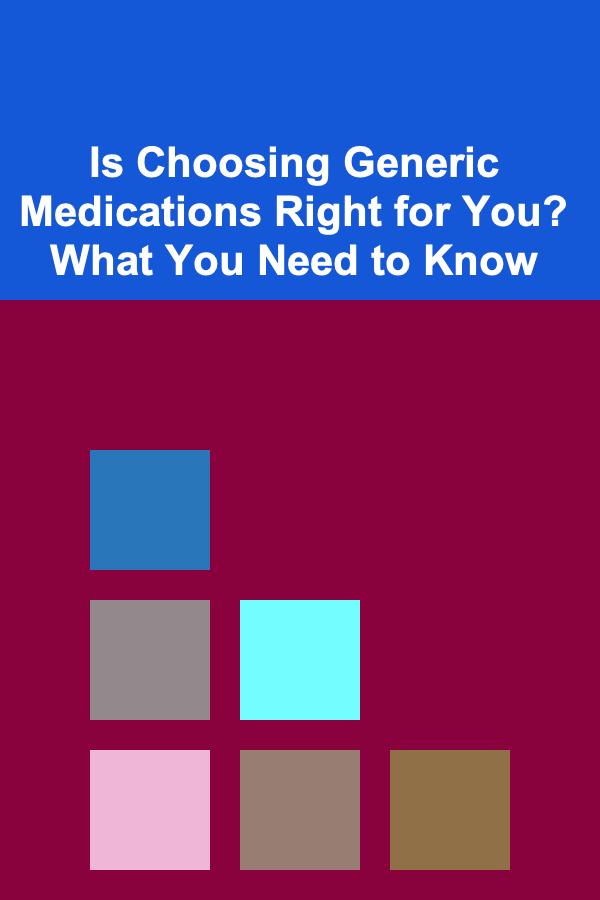
Is Choosing Generic Medications Right for You? What You Need to Know
ebook include PDF & Audio bundle (Micro Guide)
$12.99$7.99
Limited Time Offer! Order within the next:

When you visit a pharmacy to fill a prescription, you're often presented with a choice: the brand-name medication or its generic counterpart. Generic medications have become a common and cost-effective option for many patients, but the decision to choose them over brand-name drugs isn't always straightforward. There are factors to consider, including effectiveness, cost, safety, and personal preferences. In this actionable guide, we'll dive deep into the pros and cons of generic medications, how they compare to brand-name drugs, and what you should know before making your decision.
What Are Generic Medications?
Generic medications are drugs that have the same active ingredients, dosage form, strength, and route of administration as the brand-name drug. They are often marketed after the patent on the brand-name version has expired, which allows other pharmaceutical companies to produce and sell the drug under its chemical name. The U.S. Food and Drug Administration (FDA) ensures that generic drugs meet the same rigorous standards for quality, strength, purity, and stability as their branded counterparts.
Generic drugs are typically sold at a fraction of the price of the brand-name drug, making them an attractive choice for patients seeking affordable healthcare options. However, despite their affordability and equivalency in terms of the active ingredients, there are still many questions surrounding the use of generics.
Benefits of Choosing Generic Medications
1. Cost Savings
The most obvious benefit of choosing generic medications is the potential for significant cost savings. Generic drugs are generally 30% to 80% cheaper than brand-name drugs. The price difference exists because generic manufacturers do not have the costs associated with the development and marketing of the original drug. In addition, the absence of a patent allows multiple manufacturers to produce the same drug, increasing competition and driving down the price.
For patients with limited insurance coverage or those paying out of pocket, these savings can make a substantial difference in healthcare costs. Over time, using generics for long-term medications can lead to considerable savings.
2. FDA Approval and Safety Standards
Many people are wary of generics because they fear that the quality may not match the brand-name version. However, generic medications must meet the same rigorous FDA standards as branded medications. The FDA requires that generics be bioequivalent to the original drug, meaning they must have the same effects on the body when taken in the same dosage.
Before a generic drug can be marketed, the manufacturer must demonstrate that it is as safe and effective as the brand-name counterpart through clinical studies. Additionally, the FDA monitors generic drugs post-market, ensuring they maintain safety standards.
3. Widespread Availability
Due to their lower costs, generic medications are widely available at most pharmacies. This means patients can easily access essential medications without the need to search for specialty pharmacies or wait for restocks. It also means that generic alternatives are often available for a wide range of drugs, from common painkillers and antibiotics to specialty treatments for chronic conditions.
4. Increased Competition and Market Efficiency
The availability of generic drugs promotes competition in the pharmaceutical market, which can lead to better overall market efficiency. As more generic versions of a drug enter the market, brand-name drug prices often decrease, benefiting consumers overall. This competition may also spur innovation within the pharmaceutical industry as companies strive to produce new and improved medications.
Potential Downsides of Generic Medications
1. Differences in Inactive Ingredients
While generic medications contain the same active ingredients as the brand-name drug, they may differ in their inactive ingredients, such as binders, fillers, and coloring agents. These differences are generally considered to have no impact on the drug's effectiveness. However, some patients may experience sensitivities or allergic reactions to these inactive ingredients. If you have allergies or sensitivities to certain substances, it's important to check the list of inactive ingredients on the generic version.
2. Variability in Effectiveness (In Rare Cases)
Although generic medications are required to be bioequivalent to their brand-name counterparts, there may be slight variations in absorption rates or the time it takes for the drug to take effect. These small differences are usually not significant, but in rare cases, they can affect individuals, especially in drugs that require precise dosing or for those who are more sensitive to medications.
For example, patients on medications with a narrow therapeutic index (drugs where small changes in dose or blood concentration can lead to significant differences in effects) may require more careful monitoring when switching between brand-name and generic versions.
3. Perception of Lower Quality
Despite the FDA's strict regulations, there is often a stigma associated with generic drugs. Some patients and healthcare professionals may perceive generic drugs as inferior due to misconceptions about their quality or efficacy. This perception may lead some individuals to stick with brand-name medications, even when generics are available.
In some cases, patients may also worry about the reputation of a specific generic manufacturer or whether they can trust the quality of the drug. It's important to note, however, that the FDA regulates all generic medications rigorously, and all approved generics must meet the same standards for quality and efficacy.
4. Brand Loyalty and Psychological Factors
Some patients are simply more comfortable with the brand-name version of a drug. This could be due to trust in the brand, previous experience with the medication, or concerns about potential differences in formulation. In these cases, the perceived reassurance of using the brand-name drug outweighs the potential cost savings of switching to a generic.
5. Insurance Coverage Limitations
In some cases, patients may encounter challenges when using generic medications, particularly if their insurance plan does not cover them. While many insurance companies do cover generics, there may still be instances where the generic version is not included in a formulary or where the brand-name drug is preferred. In such cases, patients may need to work with their doctor or insurance company to find the best solution.
How to Decide: Is a Generic Right for You?
1. Consult Your Doctor or Pharmacist
When considering whether to choose a generic medication, it's always a good idea to consult with your doctor or pharmacist. They can provide valuable insight into whether a generic version is suitable for your condition and whether there are any specific concerns regarding the drug's formulation.
For patients with chronic conditions, a doctor's advice becomes even more critical since consistent and accurate dosing is vital. In some cases, your healthcare provider may recommend staying with a brand-name medication due to specific health needs.
2. Monitor Your Response to Medication
If you decide to try a generic medication, it's important to closely monitor how you feel after switching. Keep track of any changes in your symptoms, side effects, or any other noticeable differences. If you experience issues, contact your healthcare provider to discuss your concerns.
3. Consider Long-Term Cost Savings
If you are on a medication for a long-term condition, switching to a generic can save you significant amounts over time. Be sure to factor in your budget and your ongoing healthcare expenses. If your insurance plan covers generics, you may be able to save even more.
4. Be Open to Alternatives
If you are initially hesitant about switching to a generic, keep in mind that there are often other options available. For example, your doctor may suggest trying a different drug in the same class that is available as a generic or that may have fewer side effects or a more favorable profile for your specific needs.
Conclusion
Choosing between generic and brand-name medications requires careful consideration of several factors, including cost, effectiveness, personal health, and insurance coverage. For most patients, generic medications offer an affordable and safe alternative to brand-name drugs, with no significant loss in efficacy or safety. However, some individuals may need to weigh factors like inactive ingredients, potential sensitivity, and their doctor's recommendations before making the switch.
Ultimately, whether a generic medication is right for you depends on your unique healthcare needs and circumstances. By consulting with your healthcare provider and staying informed about the options available to you, you can make the best decision for your health and financial well-being.
Reading More From Our Other Websites
- [Organization Tip 101] How to Use a Whiteboard for Weekly Meal Planning
- [Organization Tip 101] How to Use Labels to Keep Your Bathroom Organized
- [Hiking with Kids Tip 101] Kid-Friendly Trail Snacks That Keep Energy Up and Mess Down
- [Organization Tip 101] How to Design a Volunteer Handbook for Orientation
- [Home Budget 101] How to Create a Realistic Home Budget That You Can Stick To
- [Organization Tip 101] Why Regular Maintenance Keeps Your Home Organized
- [Personal Care Tips 101] How to Find the Best Body Lotion for Your Morning Routine
- [Home Holiday Decoration 101] How to Incorporate Vintage Decorations into Modern Holiday Designs
- [Organization Tip 101] Best Organization Tools for Managing Books and Reading
- [Organization Tip 101] How to Create a Functional Entryway: Tips and Tricks

How to Keep Your Garage Secure: Tips and Tricks
Read More
How to Offer Excellent Customer Service to Increase Repeat Sales
Read More
How to Offer Online Video Production Classes for Global Students: A Step-by-Step Guide
Read More
What Should You Know About Organizing Sports Equipment?
Read More
How to Navigate the Winding Alleys of Lisbon
Read More
How to Design a Career Development Checklist for Mid-Career Professionals
Read MoreOther Products

How to Keep Your Garage Secure: Tips and Tricks
Read More
How to Offer Excellent Customer Service to Increase Repeat Sales
Read More
How to Offer Online Video Production Classes for Global Students: A Step-by-Step Guide
Read More
What Should You Know About Organizing Sports Equipment?
Read More
How to Navigate the Winding Alleys of Lisbon
Read More